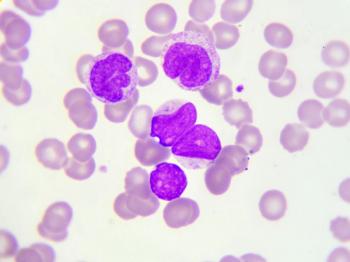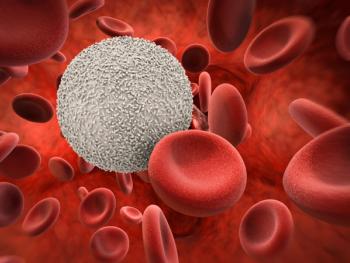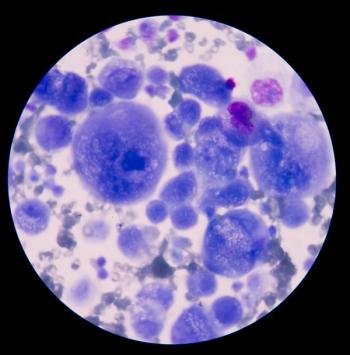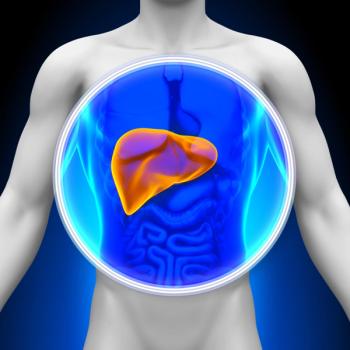
Patients with HER2-positive, metastatic biliary tract cancer experienced promising responses and a tolerable safety profile following treatment with pertuzumab plus trastuzumab.

Your AI-Trained Oncology Knowledge Connection!


Patients with HER2-positive, metastatic biliary tract cancer experienced promising responses and a tolerable safety profile following treatment with pertuzumab plus trastuzumab.

Francesco Passamonti, MD, discusses the future of treatment for patients with polycythemia vera such as adaptive therapies and the utilization of novel targets.

Based on response data from the phase 2 MAGNOLIA trial, the FDA has granted accelerated approval to the Bruton tyrosine kinase inhibitor zanubrutinib to treat patients with relapsed/refractory marginal zone lymphoma.

Patients undergoing implant-based or autologous reconstruction and received adjuvant or neoadjuvant chemotherapy did not have an association with likelihood of complications compared with those who did not undergo chemotherapy.

CancerNetwork® sat down with Alexander Spira, MD, PhD, FACP, at the 2021 World Conference on Lung Cancer to talk about clinical benefits of using mobocertinib in patients with EGFR exon 20 insertion mutation–positive non–small cell lung cancer.

Progression-free survival lengths were different among patients with non-small cell lung cancer receiving sotorasib when stratified by genomic profile.

The first patients with human papillomavirus 16–positive oropharyngeal cancer have been dosed with ISA101b, which was given a fast track designation by the FDA, as part of a phase 2 study.

Patients who were carriers of pathogenic variants of for BRCA1/2 had a better physical and mental quality of life after undergoing risk-reducing salpingectomy compared with risk-reducing salpingo-oophorectomy.

The latest episode of CancerNetwork®’s podcast examines an initiative to diversify patient populations in oncology clinical trials and increase accessibility to these opportunities.

Patients with previously treated chronic lymphocytic leukemia and small lymphocytic lymphoma appeared to benefit from treatment with pirtobrutinib.

With the combination of mobocertinib and T-DM1, potent preclinical efficacy was observed in lung cancer cells with HER2 exon 20 insertion mutations.

Patients with resectable pleural mesothelioma underwent safe and effective treatment with the triplet combination of neoadjuvant cisplatin, pemetrexed, and atezolizumab from the ongoing S1619 trial.

Patients with newly diagnosed multiple myeloma experienced rapid responses and notable rates of minimal residual disease negativity following minimal residual disease–based consolidation therapy with daratumumab, carfilzomib, lenalidomide, and dexamethasone.

Findings from a phase 2 trial indicate that the use of neoadjuvant osimertinib may hold promise in a population of patients with EGFR-mutated non–small cell lung cancer.

Adjuvant atezolizumab led to disease-free survival benefit in patients with early-stage non–small cell lung cancer, including most patient subgroups, in the phase 3 IMpower010 trial.

Patients with relapsed/refractory multiple myeloma who were treated with the recommended phase 2 dose of talquetamab experienced positive clinical activity.

Patients with non–small cell lung cancer harboring ALK mutations who were not suitable for crizotinib therapy, either due to resistance or intolerance, showed benefit with sequential crizotinib and alectinib.

Continued efficacy of CAR T-cell therapy with idecabtagene vicleucel in patients with pretreated myeloma is evidenced by updated KarMMa trial findings presented at the 18th International Myeloma Workshop.

The combination of melflufen plus dexamethasone produced a progression-free survival benefit over pomalidomide plus dexamethasone in patients with transplant-naïve relapsed/refractory multiple myeloma.

Strong response rates were observed with pirtobrutinib across dose levels to treat patients with chronic lymphocytic leukemia and small lymphocytic lymphoma ion a phase 1/2 study.

A population of patients with relapsed/refractory multiple myeloma who received elranatamab with or without lenalidomide experienced encouraging responses despite being heavily pretreated.

Patients with non-small cell lung cancer with brain metastases experienced a favorable safety profile along with efficacy results when treated with atezolizumab plus chemotherapy.

Epcoritamab monotherapy yielded positive results in patients with relapsed/refractory B-cell non-Hodgkin lymphoma and should be studied further, according to investigators.

Ciltacabtagene autoleucel may provide patients with myeloma who have developed progressive disease a more long-term treatment option.

Strategies from the COVID-19 pandemic such as flexible, patient-focused approaches and telehealth may work to increase enrollment on clinical lung cancer trials by increasing accessibility.

Minimal residual disease negativity may predict outcomes for patients with multiple myeloma on maintenance therapy with lenalidomide who previously underwent autologous stem cell transplantation.

CancerNetwork® sat down with Alexander Spira, MD, PhD, FACP, at the 2021 World Conference on Lung Cancer to talk about KRAS as a therapy biomarker in lung cancer.

The NovoTTF-200T System was given a breakthrough designation by the FDA as treatment strategy that may work in conjunction with bevacizumab and atezolizumab to treat patients with advanced liver cancer.

CancerNetwork® sat down with Larry Anderson, MD, PhD, at the 18th International Myeloma Workshop to talk about how the emergence of CAR T-cell therapies in multiple myeloma affects multidisciplinary clinicians.

Findings from a phase 1/2 study indicated that patients with relapsed/refractory multiple myeloma who were treated with iberdomide plus dexamethasone and daratumumab/bortezomib or carfilzombib experienced promising efficacy and tolerable safety.